Snorkeling vs. Scuba Diving? Which one is good for you?
Snorkeling vs. scuba diving: compare gear, training, costs, and experiences to choose your adventure.
I remember the thrill the first time I looked underwater and saw colorful fish darting around vibrant coral. It felt like stepping into a whole new world! You can explore this amazing place by floating on the surface with a snorkel or diving deeper with scuba gear. But which one is right for you? Let's look at snorkeling and scuba diving to help you choose your next underwater adventure.
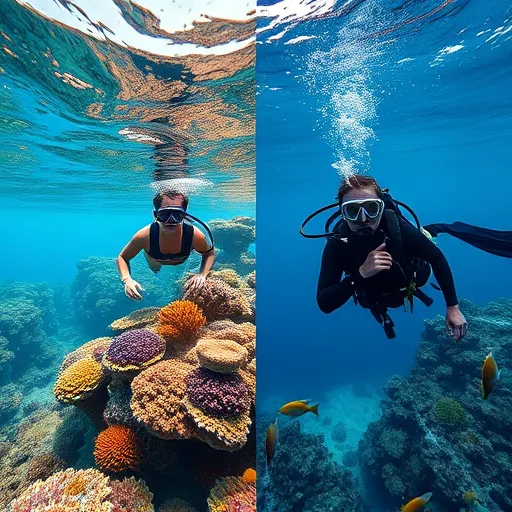
What Is Snorkeling?
Snorkeling lets you see underwater life without much gear or special training. All you need is a mask, snorkel, and fins. You float on the water's surface, breathe through the snorkel, and enjoy the view below. It's easy for most people and gives you a peek into marine worlds often close to the shore.
Many tropical places like Hawaii, the Caribbean, and Australia's Great Barrier Reef are great for snorkeling. You might find yourself floating above colorful fish or watching a sea turtle glide beneath you. And the best part is, you don't need any experience. With a little guidance, beginners can start snorkeling right away.
What Is Scuba Diving?
Scuba diving lets you dive deep into the underwater world. "Scuba" stands for Self-Contained Underwater Breathing Apparatus. With special gear like an air tank, you can go below the surface and stay underwater for a long time.
Scuba diving offers many exciting experiences. You can explore shipwrecks full of history or swim next to huge manta rays. But scuba diving needs training and certification to keep you safe. It takes time and money, but many people find it's worth it for the amazing experiences.
Equipment Differences
Scuba diving needs more advanced gear than snorkelling, of course. Let's take a look at it deeper:
Snorkeling Gear
Mask: Lets you see clearly underwater. A good fit stops water from leaking in.
Snorkel: A tube to breathe through while your face is in the water. Some have features like purge valves or splash guards.
Fins: Help you move through the water easily without getting tired.
Scuba Diving Gear
Mask and Fins: Similar to snorkeling gear but often higher quality or made for deeper dives.
Regulator: Allows you to breathe from the air tank by reducing high-pressure air.
Air Tank: Holds compressed air so you can breathe underwater.
Buoyancy Control Device (BCD): A vest that helps you float, rise, or sink when needed.
Gauges: Show your depth, how much air you have left, and sometimes other info like water temperature.
Wetsuit or Drysuit: Keeps you warm in cooler water.
Scuba gear might seem like a lot at first, but with training, you get comfortable with it. Each piece helps make your dive safe and fun.
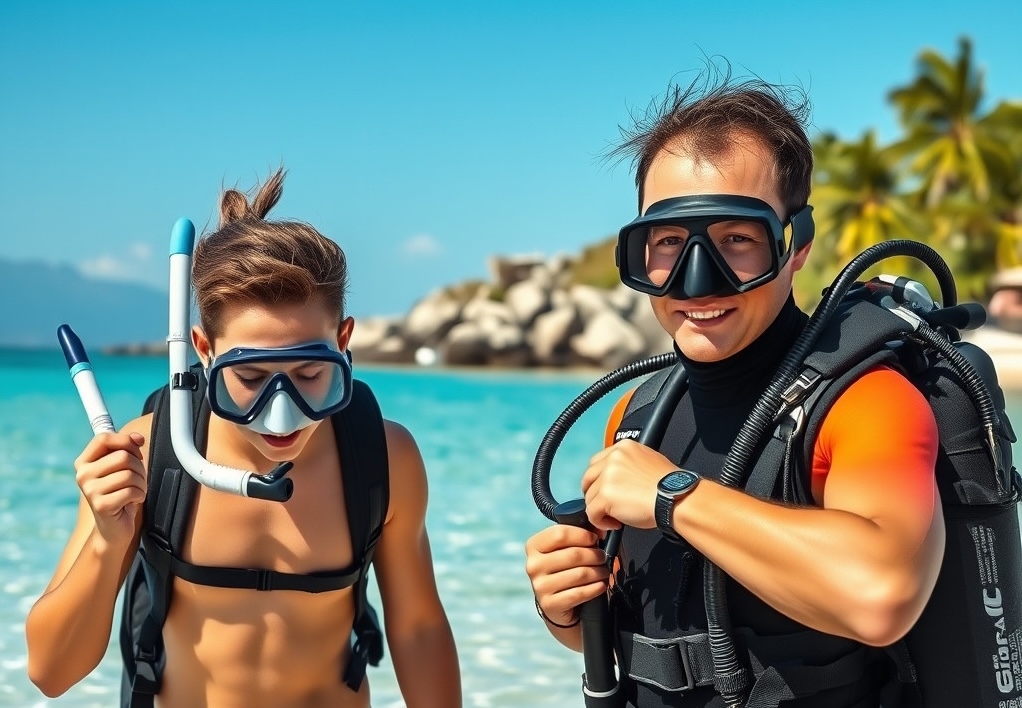
Training and Certification
Snorkeling doesn't need formal training. But it's helpful to know basic swimming and feel comfortable in the water. Many resorts and tour operators offer short lessons to get you started. They might show you how to clear your mask, snorkel properly, and stay safe.
Scuba diving needs more effort. You need to take certification courses from groups like PADI or SSI before you can dive on your own.
The certification process usually includes:
Learning the Basics: Study dive theory, equipment, safety rules, and how pressure affects your body.
Pool Sessions: Practice important skills in a pool or controlled setting.
Open Water Dives: Do supervised dives in real water to use what you've learned.
The whole course can take a few days to a few weeks, depending on the program and your schedule.
Ease of Learning
If you want an easy way to explore underwater, snorkeling is a great choice. It's simple and fun for all ages. Kids and adults can enjoy snorkeling with little instruction.
Scuba diving is more complex but still doable for many people. With good teaching, most can learn to dive. It takes a willingness to learn and basic fitness. Feeling nervous at first is normal, but instructors help you build confidence.
Snorkeling Costs
Equipment Rental or Purchase: Renting snorkel gear is cheap, often under $20 per day. Buying your own gear can cost $50 to $200, depending on quality.
Tours and Trips: Guided snorkeling tours might cost $30 to $100, depending on where you go and how long it lasts.
Scuba Diving Costs
Certification Courses: An Open Water Diver course can cost $300 to $500.
Equipment Rental: Renting scuba gear may cost $50 to $100 per day.
Diving Trips: Prices vary. A two-dive trip might be $80 to $150.
Equipment Purchase: If you buy your own scuba gear, expect to spend $1,000 or more.
Scuba diving costs more than snorkeling, but many people think it's a good investment for the unique experiences.
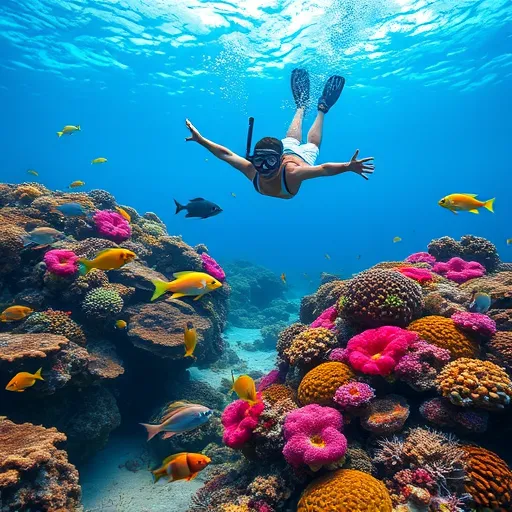
Safety Considerations
Snorkeling is generally safe, but stay aware of your surroundings:
Weather and Water Conditions: Don't snorkel in rough seas or bad weather.
Currents and Tides: Watch out for currents that could pull you away from shore.
Boat Traffic: Use a dive flag if snorkeling where boats are.
Sun Protection: Wear sunscreen or protective clothing to avoid sunburn.
Scuba diving has risks, but proper training reduces them:
Dive with a Buddy: Always dive with a partner for safety.
Watch Your Air Supply: Keep track of how much air you have and your depth.
Equalizing Pressure: Learn how to balance pressure in your ears to avoid discomfort.
Avoid Decompression Sickness: Follow dive tables or use a dive computer to manage your time and how quickly you come up.
Health Concerns: Some medical conditions can affect diving, so be honest about your health during training.
By following safety rules, both activities can be enjoyed safely.
Depth and Marine Life Encounters
Snorkeling Experiences
Snorkelers usually stay in shallow water, often less than 10 feet deep. Even so, shallow reefs have lots of life:
Coral Gardens: Colorful corals with many fish and creatures.
Tropical Fish: Common sights include angelfish, clownfish, and butterflyfish.
Sea Turtles: In some places, turtles feed in shallow waters.
Surface Sightings: You might see dolphins or even whales from the surface.
Scuba Diving Experiences
Scuba diving lets you explore deeper places:
Wreck Diving: Explore sunken ships and artificial reefs.
Caves and Caverns: Discover underwater caves and rock formations.
Large Marine Animals: Meet sharks, manta rays, and schools of big fish like barracuda.
Tiny Creatures: Get close to small animals like nudibranchs and seahorses.
Being able to dive deeper and stay longer gives you chances to see marine life and habitats you can't reach by snorkeling.
Environmental Impact
Being responsible is important to protect delicate marine ecosystems.
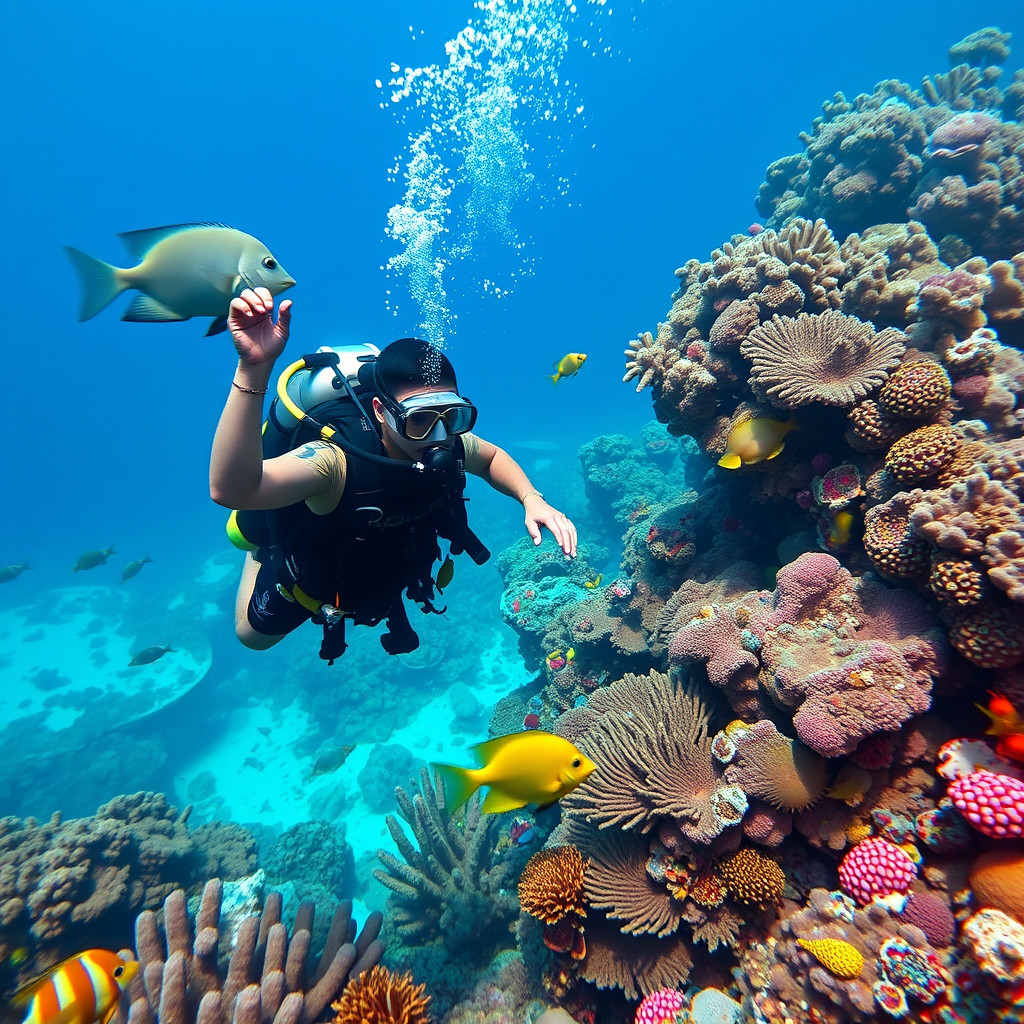
Snorkeling Etiquette
Don't Touch: Avoid touching corals or sea life; it can harm them.
Don't Stand on Reefs: Standing on coral can kill it and damage reefs.
Use Reef-Safe Sunscreen: Regular sunscreen can hurt corals. Use reef-safe types.
Scuba Diving Etiquette
Good Buoyancy: Avoid accidentally touching the reef or sea floor.
Respect Wildlife: Watch animals without chasing or bothering them.
Leave No Trace: Don't take souvenirs or disturb habitats.
By following these guidelines, you help keep the underwater world healthy for the future.
Health and Physical Requirements
Snorkeling
Swimming Ability: Basic swimming skills are important.
Fitness Level: Snorkeling can be done at an easy pace, suitable for most people.
Medical Conditions: Generally accessible, but check with a doctor if you have concerns.
Scuba Diving
Swimming Skills: You need to be comfortable in water and able to swim a short distance.
Fitness Level: Diving can be physically demanding. You need a reasonable level of fitness.
Medical Clearance: Some health conditions may prevent you from diving. A medical questionnaire is part of the training.
Weather and Seasonal Factors
Snorkeling: Best during calm seas and good visibility, often in summer months in many places.
Scuba Diving: Can be done year-round in many areas, but conditions like water temperature and visibility can change with the seasons.
Travel and Destinations
Snorkeling Spots: Places like the Maldives, the Bahamas, and Thailand offer amazing snorkeling.
Diving Destinations: The Red Sea, Indonesia's Raja Ampat, and Belize's Blue Hole are famous among divers.
Underwater Photography
Both snorkeling and scuba diving offer great chances for photography. With waterproof cameras or housings, you can capture the beauty underwater.
Snorkeling Photos: Great for wide shots of reefs and schools of fish near the surface.
Scuba Diving Photos: Allows close-ups of creatures at depth, and shots of wrecks and larger animals.
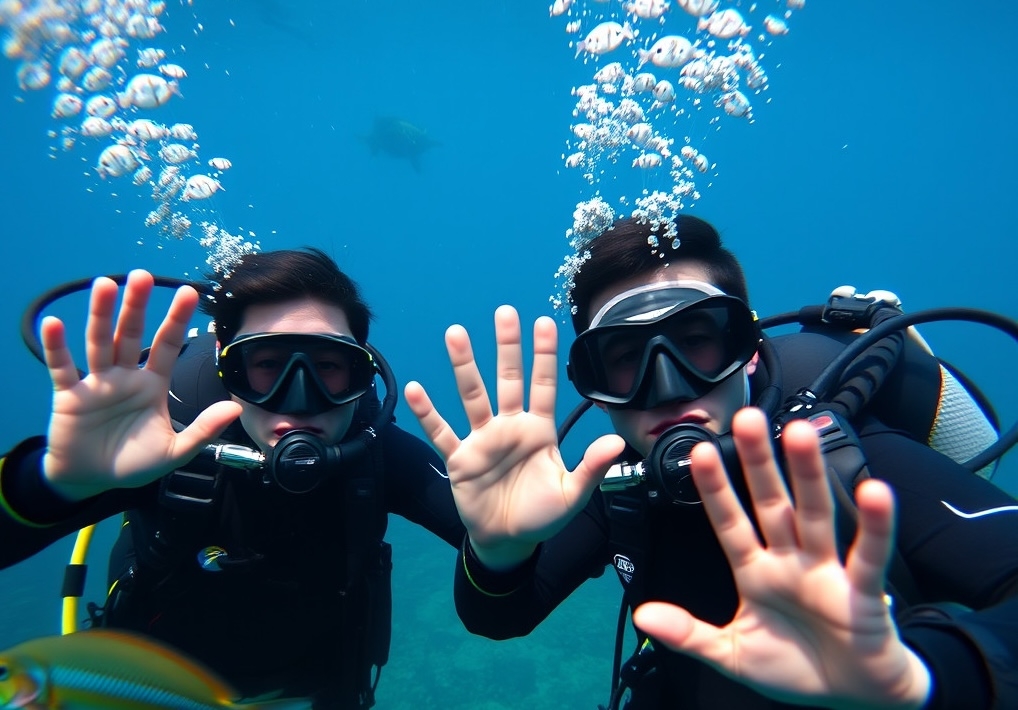
Which One Is Right for You?
Think about these things to decide:
Time Available: If you're on a short trip, snorkeling might fit better.
Depth Desire: If you want to go deeper and see more marine life, scuba diving might be more your thing.
Budget: Consider what you're comfortable spending on gear and training.
Comfort Level: Think about how comfortable you are in the water and with being underwater for longer.
Adventure Level: Both activities are adventurous, but scuba diving can take you further into the underwater world.
You don't have to pick just one. Many people enjoy both at different times. You might start with snorkeling and later decide to learn scuba diving.
Tips for Beginners
Starting with Snorkeling
Choose the Right Gear: A mask that fits well is key to comfort. Try different masks to find one that seals well.
Practice in Shallow Water: Before going deeper, practice breathing through your snorkel and get used to your fins.
Stay Relaxed: Move slowly and calmly to save energy and not scare marine life.
Starting with Scuba Diving
Find a Good Dive Center: Look for certified instructors and good reviews.
Communicate Openly: Tell your instructor if you're worried or need extra help.
Take It Slow: Don't rush your training. Take time to master each skill.
Common Misconceptions
"Scuba Diving Is Dangerous": While there are risks, proper training and following safety rules make scuba diving safe.
"Snorkeling Is Boring Compared to Diving": Snorkeling offers a different view and can be just as exciting, especially in rich environments.
"You Have to Be Very Fit to Dive": While basic fitness is needed, you don't have to be an athlete to enjoy scuba diving.

Conclusion
Both snorkeling and scuba diving let you connect with the ocean in unique ways. They offer a break from daily life and a chance to see marine life up close. Floating weightlessly, seeing bright colors, and watching sea creatures create unforgettable memories.
The ocean is full of wonders waiting for you. Whether you choose snorkeling or scuba diving, you're in for an incredible experience. So grab your gear, dive in, and explore the amazing underwater world!
FAQ
Can I wear contact lenses while snorkeling or diving?
Yes, you can wear contacts under your mask. Or you can get prescription masks for snorkeling and diving.
What if I feel claustrophobic underwater?
It's common to feel nervous at first. Taking it slow, practicing in shallow water, and focusing on breathing can help. Starting with snorkeling might help build confidence before trying scuba diving.
Is snorkeling safe for children?
Yes! Snorkeling is great for kids. Make sure they are supervised, use safety gear like life vests, and choose calm, shallow waters for the best experience.
Snorkeling or scuba diving? Which one should I choose if I can't swim well?
Snorkeling is much more easier than scuba diving. You don't have to be a good swimmer for snorkeling, but basic swimming skills are important for scuba diving. You need to be able to swim at least 200 meters and tread water.
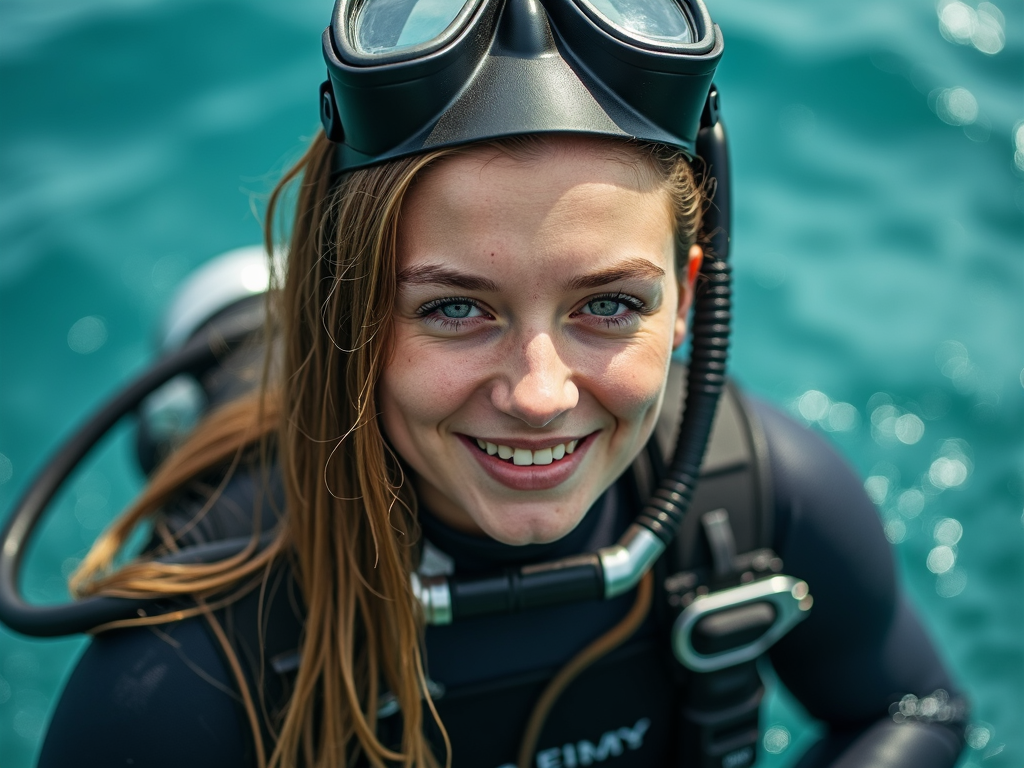
I'm a scuba enthusiast, and marine life lover. I enjoy writing about my diving adventures and sharing my knowledge with others.

I'm a passionate scuba diver and love to share my experiences with you. I enjoy writing about my experiences and sharing my knowledge with others.